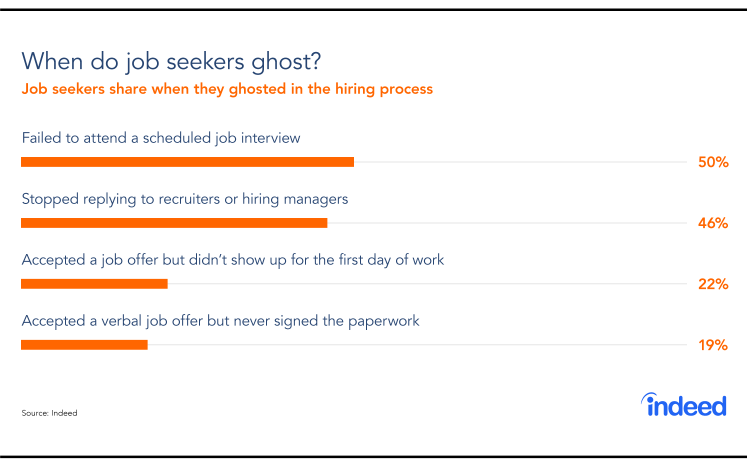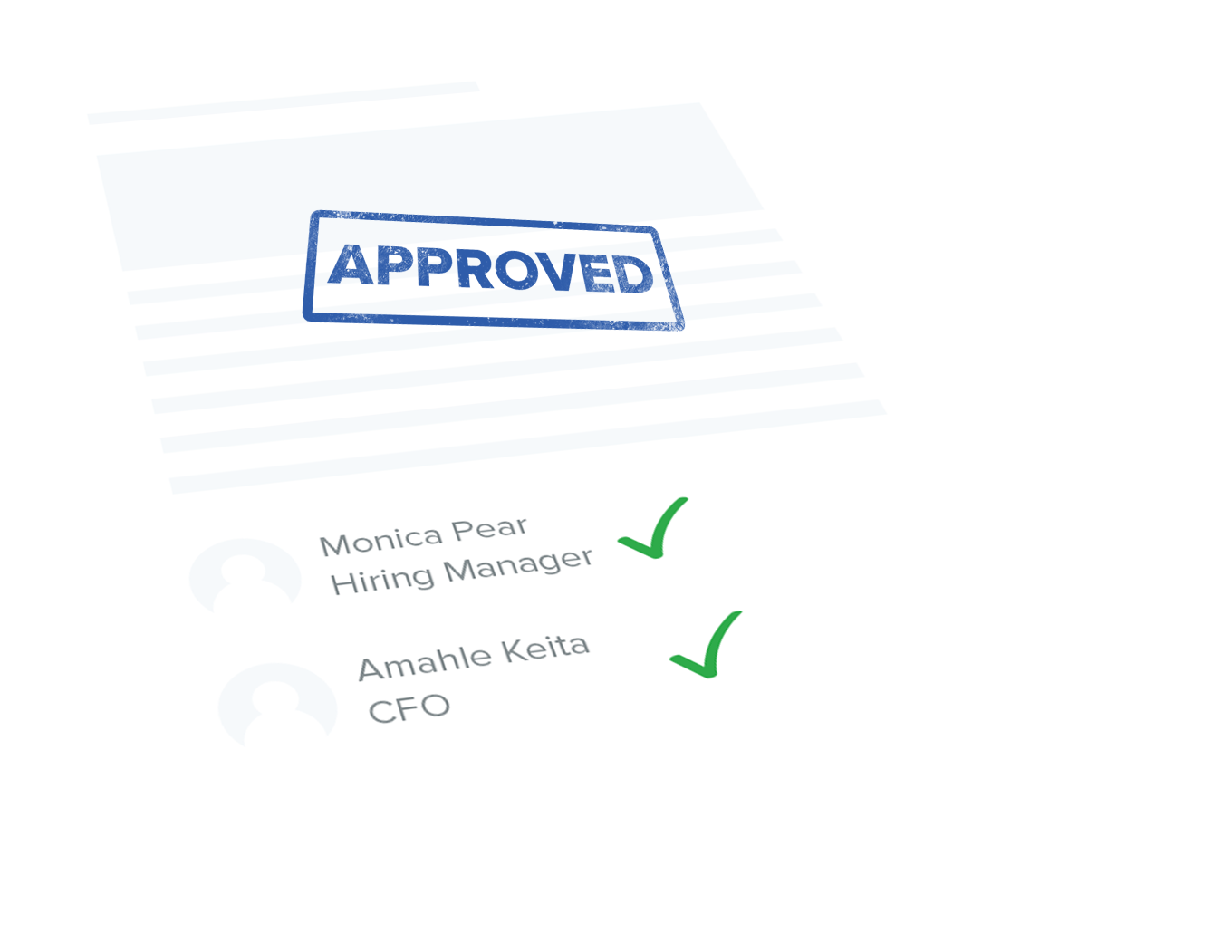Seeing a great candidate drop out of the recruitment process is disappointing. You offer job applicants all the answers and reassure them they’ll be a good fit, only for them to not show up for their first day at work.
Learning how to make a job offer that works against this new candidate ghosting will help you save both time and money.
For instance, you can look for signs of ghosting, deliver offers in real time, and make your pre-boarding ghost-proof.
Read on to learn more about new-hire candidate ghosting and the actionable steps you can take during every stage of the recruitment process to reduce it.
What Is New-Hire Candidate Ghosting?
New-hire ghosting happens when a new hire never shows up for their first day despite signing an offer or agreeing to work with your company.
There’s a decent chance it has happened to you. Studies show that 22% of candidates report accepting a job offer only to never show up for their first workday.

Source: Indeed
When the job market is hot for candidates, your new hires can afford to be much more particular, entertaining multiple offers at once and choosing the one they like best.
The trend is getting worse, too.
Indeed surveyed 500 job seekers and found 28% of the job seekers had ghosted their potential employer in 2020, up from only 18% in 2018.
But if you know how to make a job offer to the right candidate, you can address this issue at your company.
Here’s what you can do at every stage of the recruitment process to reduce new-hire ghosting.
1. Analyze the Role
Some jobs are just going to attract ghosters. Ask yourself these questions to assess whether the role is more likely to get some unreliable applicants:
Is the job incredibly in-demand, or does it require an in-demand skill? Candidates with the most offers are most likely to drop out last minute for a better job. You may need to offer job applicants a better package in these cases.
Is the job in an industry where people often switch jobs? If you’re in an industry with less stigma around frequent job-switching, the bar is lower for your new hire.
What is your company’s reputation? Be realistic. If your online reviews are anything less than glowing, your new hires are more likely to ghost when they receive a more attractive offer than yours.
2. Scrutinize the Resume
Before you bring the candidate in, look for these signs on their resume to see if they’re likely to ghost:
- Frequent job changes
- Being too well-qualified for the role
- History of big-name companies
If you notice any of these signs, be on a lookout for other hints. Plan what to ask in the interview stage and get more detail on their job changes and motivations for working for the company.
You can also look for positive signs. For instance, you can compare the resume and cover letter with your job description and scan for evidence that they customized their resume, unlike other job applicants.
Did they add keywords you used? Did they make a point to name the skill sets you need? If they did, that’s a strong indicator they’re interested in working with you.
3. Look for Signs of Ghosting in the Interview
Many interviewers assume that a candidate coming in for an interview shows enough interest in the job, but that’s not always true.
If you’re interviewing someone, you need to ask questions that assess the applicant’s interest in the role and your company and likelihood to commit.
For instance, here’re some questions you should ask as a hiring manager:
- What aspects of the role are you most/least interested in?
- What do you know about [Company]?
- What would make you want to stay at [Company] for the next five years?
- Why are you leaving your current job?
- Why are you interested in [Company]?
4. Inquire About Other Offers
Before you make an offer, get an idea about the other offers the job applicant may have received. Check if they’re interviewing with other companies since candidate ghosting often happens when they receive a better offer.
You can be certain they’ve applied to other companies in their job search — about 10-15 a week if they followed Indeed’s advice — but how many, how recently, and how far along those applications are will give you a better sense of how likely you are to snag a candidate.
5. Deliver Offers in Real Time
When you’re ready to make an offer, don’t send out an email. Call your job candidate to make the offer.
You’ll probably go to voicemail — but don’t give them the offer there either. Instead, ask the job applicant to call you back when it’s convenient.
That’s because you can assess how excited the candidate is via call, which is much harder to do over email. Determining how to make a job offer that sticks is tricky; not every “Yes” is created equal after all. The phone call will enable you to determine how strong their yes is.
If possible, you can also deliver the news over a video call, which gives you an even extra dimension for assessment.
Phone calls have also been proven to create stronger bonds than written communications.
On your call, be sure to:
Congratulate them: This is the first step to building a relationship and investing in them as an employee.
Give them time to consider: Get an estimate of when you’ll hear back.
Ask for their questions: Help assuage any last hesitations in this call.
6. Take Pre-Boarding Seriously
You put in a ton of effort to find your candidate, and that work doesn’t stop once they accept your offer.
Building a genuine relationship with the new hire is the key to reducing candidate ghosting. You can’t keep everyone from finding a better offer last minute, but you can at least make them feel comfortable through your candidate experience to be honest with you rather than no-showing.
In other words, pre-boarding isn’t the time to go silent — this is the time to show your new hires some love and make them excited to work with you before the official onboarding process.
Try:
- Connecting them with their teammates
- Sending flowers for congratulations
- Starting an email welcome chain with the whole office
- Setting up a casual mentor meeting with their new coworker
- Building rapport by sharing stories
- Connecting on LinkedIn or social media
- Creating a welcome packet with fun facts about their coworkers
Whatever you do, follow up with consistent communication to nurture the relationship.
7. Keep Up With Competition
If, after all this, you still experience candidate ghosting, you need to be more realistic about your market and competition. There’s a good chance you simply aren’t stacking up against the other companies in your industry.
If you make below-market offers and use pressure tactics like exploding offers to get people to accept, you shouldn’t be shocked when people bail.
Assess your:
Compensation: A recent Gallup survey shows that the number one factor in taking a new position for candidates is an increase in income or benefits.
Responsibilities: Is this a real role or a hodgepodge of tasks no one else wants to do? Look at the kind of experiences other companies are offering candidates.
Company Culture: Does your company emphasize working all the time with no work-life balance? How’s your human resources’ commitment to diversity? The initiatives you take to show commitment to a positive environment for everyone dictate whether a candidate shows up or not.
Final Thoughts: How To Make a Job Offer Your Candidates Won’t Ghost On
Ultimately, just about every stage in your interview process plays a role in getting new hires to show up or ditch on the first day. You need to offer job applicants enough value that they feel compelled to show up.
The bottom line is that encouraging authentic, open communication with your candidate will greatly reduce the amount of new hire candidate ghosting you see.
Continue to improve your hiring process with JobScore, the recruitment software that is simple and effective.



